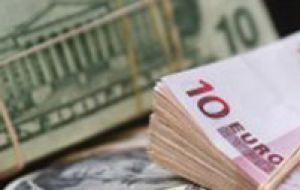MercoPress. South Atlantic News Agency
Black Thursday in US and Europe turns into black Friday in Asia
 Markets volatility is expected to continue given the dollar and Euro confidence crises
Markets volatility is expected to continue given the dollar and Euro confidence crises Asian stock markets have slumped on Friday, extending a global equity sell-off after Wall Street had its worst day in more than two years. Japan's main Nikkei 225 index shed 3.4% to 9,329.75. South Korea lost 4.2%, Australia slid 2.4% and China's Shanghai SE Composite Index was down 2%.
On Thursday, shares in the US, Europe and Latin America tumbled on fears about the strength of the US economic recovery, the Euro zone debt crisis and possible Asian weakness as a consequence.
Analysts warned that global markets may remain volatile in the coming weeks.
The sell-off in global equities has hit investors hard. Over the past nine trading sessions, the US S&P 500 stock index has lost 1.37tn dollars from its total market value.
In Europe, the UK's FTSE has seen £160.9bn wiped off its market value. In Germany, the Dax has shed 85.5bn Euros with France's Cac losing 13.6bn Euros.
Throughout 2011, global markets have been trying to absorb and process a number of significant shocks.
The first of half of the year saw a deadly tsunami and earthquake strike Japan, hurting the world's third-biggest economy just as it looked as if growth was picking up.
At the same time, there was a spike in oil prices caused by the political unrest in North Africa and the Middle-East. Bubbling away in the background the whole time were the growing debt problems in the US and the Euro zone.
However, despite these issues, analysts say many investors were optimistic that underlying global growth would be helped along by expansion in China, Asia's other fast-growing nations and Latin America.
That optimism seems to have dissipated in recent weeks as policymakers' failure to deal with the global fiscal problems was compounded by some weak economic data out of the US. Also, the efforts of governments and central banks to transmit stability into the markets seem to have fallen short of their goal.
On Thursday, in a move that many analysts called a short-term fix, Japan intervened in the currency market in an attempt to weaken the strong yen and buy some succour for exporters. The Swiss did something similar with their strong demanded franc.
On Thursday in the US, the Dow Jones index had its worst day since December 2008, closing down 512.76 points, or 4.3%, at 11,383.68. Wall Street's other leading indexes also slid, with the S&P 500 index falling 4.8% and the tech-heavy Nasdaq more than 5% lower.
Earlier in the day, Europe had been under heavy selling pressure, with its main indexes losing more than 3%.
This came after European Commission President Jose Manuel Barroso warned that the region's sovereign debt crisis was spreading, sparking fears that Italy and Spain might become engulfed in the problems.
London's FTSE 100 index and Frankfurt's Dax had their worst day this year on Thursday, closing almost 3.5% lower. Milan’s stock exchange lost 5.16% and Spain was down 3.80%.




Top Comments
Disclaimer & comment rulesCommenting for this story is now closed.
If you have a Facebook account, become a fan and comment on our Facebook Page!